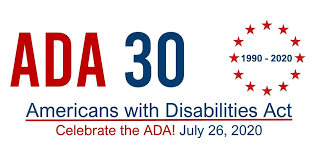On July 26th 1990, the Americans with Disabilities Act (ADA) was signed into law by President George H.W. Bush. What is the ADA? According to their website, it is: “a civil rights law that prohibits discrimination against individuals with disabilities in all areas of public life, including jobs, schools, transportation, and all public and private places that are open to the general public. The purpose of the law is to make sure that people with disabilities have the same rights and opportunities as everyone else. The ADA gives civil rights protections to individuals with disabilities, similar to those provided to individuals on the basis of race, color, sex, national origin, age, and religion. It guarantees equal opportunity for individuals with disabilities in public accommodations, employment, transportation, state and local government services, and telecommunications.”
What does this mean for college and university students?
Both public and private colleges/universities have to provide equal access to postsecondary education for those with disabilities. All public or private schools that get federal funding are required, under Section 504 of the Rehabilitation Act, to make their programs accessible for those with disabilities. You can read more about it here.
It can be confusing to know what is covered under what law, but this page has a great chart about it, as well as other information.
Even though the ADA has been in place for 30 years, it doesn’t mean it’s always smooth sailing, unfortunately. Sometimes teachers or schools aren’t aware of accommodations they need to provide, or they are unwilling or don’t have the tools to do so. There may be ableism at the school. But there are things you can do to help address any challenges you might encounter at school.
What you can do at school if you have a disability
Meet with the office of disabilities or campus disability coordinator. The exact title of the office or person can vary among institutions, but they exist and are there to help you. They can help outline what accommodations can be made, who is on campus to help you, and any resources that might be of help.
Talk with your advisor. Ask about the writing center, tutoring services, and any resources or assistance they might know about. The writing center can be a great resource for study skills groups, tutoring, and other academic services.
Know how to contact the academic ombudsman. The ombudsman is there in case of discrimination or if a situation comes up that may violate your rights regarding your disability. They can help you navigate the situation.
Be familiar with the counseling center, even if you never use it. The counseling center is usually more than just counseling – they often offer support groups on various topics, including stress reduction or test anxiety.
If your school is online, become familiar with the online platforms and how to navigate them prior to classes beginning. If you experience any difficulty or know that certain things will be challenging, talk with your advisor and/or professor to come up with modifications or solutions that will enable you to participate.
Here at Dissertation Editor, we’ve worked with many students with disabilities. While we cannot do your work for you, we offer a variety of services that can help you achieve your goals: dissertation/thesis coaching and consultations, editing, formatting, data analysis help, and more. Contact us today to learn more about the services we offer, and how we can be of assistance.
< Books to Read in Honor of the ADA Turning 30 It's Summer! Here's How to Stay Motivated >